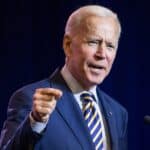








A federal appeals court just kneecapped President Trump’s tariff strategy, ruling it illegal. On Friday, the court declared Trump’s use of emergency powers to slap tariffs on imports was unlawful. This decision could unravel a key pillar of his economic vision.
Just The News reported that the court’s ruling struck down many of Trump’s tariffs, which he claims fueled a record-breaking $15 trillion in U.S. investments. Trump took to Truth Social on Sunday, warning that the decision could wipe out “almost all” of those investments.
In one fell swoop, a judicial gavel might derail years of economic momentum. Trump didn’t mince words, calling the federal appeals court a “radical left” outfit.
His frustration is palpable—tariffs were his signature move to boost American industry. Yet, the court’s ruling suggests his approach overstepped legal bounds, leaving conservatives questioning judicial overreach.
The tariffs, Trump argues, were the backbone of a $15 trillion investment surge. “More than 15 Trillion Dollars will be invested in the USA, a RECORD,” he boasted on Truth Social. But with the court’s ruling, that economic boon could vanish faster than a progressive’s promises during campaign season.
The court’s logic hinges on Trump’s misuse of emergency powers. It’s a technical jab, but one that lands hard on his administration’s agenda. Conservatives see this as another example of unelected judges meddling in policy that voters supported.
Trump’s warning wasn’t subtle—he sees catastrophe looming. He claimed the loss of these tariffs could reduce America to a “Third World Nation.” Hyperbole or not, the stakes feel sky-high for those who back his economic nationalism.
The tariffs were designed to shield American businesses from cheap imports. By taxing overseas goods, Trump aimed to bring jobs and investment back home. The court, however, saw it as an executive power grab, not a legitimate emergency.
Trump’s Truth Social post doubled down on the tariffs’ importance. “Much of this investment is because of Tariffs,” he insisted. To his base, this rings true—tariffs leveled the playing field for American workers against globalist trade policies.
But the “radical left” court, as Trump dubbed it, begs to differ. Their ruling suggests the tariffs were less about economic strategy and more about bending the law. It’s a classic clash: bold leadership versus bureaucratic restraint.
Trump’s dire prediction paints a grim picture for America’s future. “No hope of GREATNESS again,” he warned, if the tariffs are scrapped. For his supporters, this is a rallying cry to fight judicial activism that threatens prosperity.
The $15 trillion figure is staggering, even if it’s Trump’s estimate. It underscores how much he’s banking on tariffs to drive economic growth. Losing that could embolden critics who claim his policies were always on shaky legal ground.
The court’s decision doesn’t just nix tariffs—it challenges Trump’s broader vision. His economic nationalism hinges on protecting American industries from foreign competition. Without tariffs, that dream might fizzle, leaving conservatives fuming at another roadblock.
Trump’s urgency was clear in his Truth Social plea: “TIME IS OF THE ESSENCE!!!” He’s not wrong—investments tied to tariffs could dry up quickly if businesses lose confidence. The clock is ticking for his team to find a legal workaround.
For now, the “radical left” court holds the upper hand. Their ruling exposes the fragility of using emergency powers for economic policy. Conservatives argue this is less about law and more about ideology derailing progress.
Trump’s fight isn’t over, but the court’s decision is a gut punch. His vision of American greatness—fueled by tariffs and investment—now faces a judicial gauntlet. Whether he can rally the base and reverse this setback remains the million-dollar question—or rather, the $15 trillion one.



